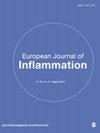硫酸镁增强脂多糖耐受性
IF 0.8
4区 医学
Q4 IMMUNOLOGY
引用次数: 1
摘要
脂多糖(LPS)耐受是预先暴露于LPS后LPS信号的下调,它提供对过度活跃炎症的保护。细胞因子的产生在LPS耐受期间减少,并且LPS耐受的单核细胞的表型向M2(抗炎)型转变。硫酸镁(MgSO4)是一种广泛使用的抗炎剂。尽管MgSO4抑制LPS信号传导,但MgSO4对LPS耐受性的影响尚不清楚。在本研究中,我们研究了MgSO4对LPS耐受性的体外影响。为了诱导LPS耐受性,在预暴露于LPS(200 ng/mL,24小时)后,用LPS(200 mg/mL,2小时)刺激THP-1细胞,同时或不预处理MgSO4(20 mM,24 h)。我们的结果显示,MgSO4通过下调核因子-κB(NF-κB)诱导的肿瘤坏死因子-α或白细胞介素-6,并上调分化簇163(一种M2相关标志物)来增强LPS耐受性。此外,LPS诱导的磷酸肌醇3-激酶(PI3K)的上调在LPS耐受过程中显著增加。MgSO4激活LPS刺激的细胞中的PI3K,但抑制NF-κB。值得注意的是,MgSO4减轻了LPS耐受细胞中PI3K和NF-κB的信号传导,表明MgSO4对LPS耐受的影响依赖于PI3K与NF-κB之间串扰的调节。MgSO4增强了LSP耐受性,从而为MgSO4抗炎作用的新的潜在机制提供了证据。本文章由计算机程序翻译,如有差异,请以英文原文为准。
Magnesium sulfate enhances lipopolysaccharide tolerance
Lipopolysaccharide (LPS) tolerance is the downregulation of LPS signaling after pre-exposure to LPS, and it provides protection against hyperactive inflammation. Cytokine production decreases during LPS tolerance, and the phenotype of LPS-tolerant monocytes shifts toward M2 (anti-inflammatory) type. Magnesium sulfate (MgSO4) is a widely used anti-inflammatory agent. Although MgSO4 inhibits LPS signaling, the effect of MgSO4 on LPS tolerance is unknown. In the present study, we investigated the in vitro effects of MgSO4 on LPS tolerance. To induce LPS tolerance, THP-1 cells were stimulated with LPS (200 ng/mL, 2 h) after pre-exposure to LPS (200 ng/mL, 24 h) with or without pre-treatment of MgSO4 (20 mM, 24 h). Our results revealed that MgSO4 enhanced LPS tolerance by downregulating nuclear factor-κB (NF-κB)-induced tumor necrosis factor-α or interleukin-6, and upregulating cluster of differentiation 163 (a M2-associated marker). Furthermore, the LPS-triggered upregulation of phosphoinositide 3-kinase (PI3K) was significantly increased during LPS tolerance. MgSO4 activated PI3K, but inhibited NF-κB in LPS-stimulated cells. Notably, MgSO4 mitigated the signaling of both PI3K and NF-κB in LPS-tolerant cells, suggesting the effect of MgSO4 on LPS tolerance relies on the modulation of the crosstalk between PI3K and NF-κB. MgSO4 enhanced LSP tolerance, thus providing evidence for a novel underlying mechanism of the anti-inflammatory effects of MgSO4.
求助全文
通过发布文献求助,成功后即可免费获取论文全文。
去求助
来源期刊
CiteScore
0.90
自引率
0.00%
发文量
54
审稿时长
15 weeks
期刊介绍:
European Journal of Inflammation is a multidisciplinary, peer-reviewed, open access journal covering a wide range of topics in inflammation, including immunology, pathology, pharmacology and related general experimental and clinical research.

 求助内容:
求助内容: 应助结果提醒方式:
应助结果提醒方式:


